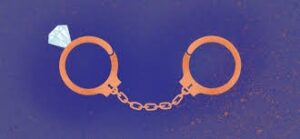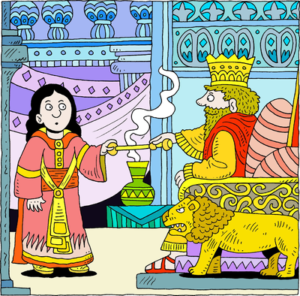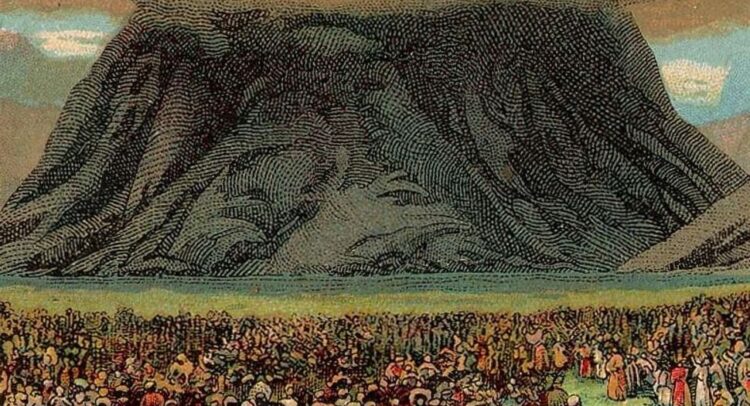Raboyseyee and Ladies,
The heylige Ois and eishes chayil are still in Israel for another 12 days doing what we can.
Coerced Marriage?
Shoin: Yeshiva week (winter vacation) is over, as is l chitchat with hi-bye friends about where we vacationed, our respective flights, and hotel stays. Discussions about restaurant lines and reviews are also coming to an end; who cares? The one question no one seems to ask is: how the hec did you manage to get up to the 30th floor and open your door using those electronic keys on the heylige Shabbis, sheygitz (bum) that you are, and vey iz mir! The bottom line: Over vacation, Yiddin seemingly become shenui experts and worse. More good news: Yom Kippur is not too far off.
Those who worship the sun rather than the RBSO, are quickly finding out that it’s avoido zoro, mamish. Other than the potential of skin cancer -eventually- the sun has no long-lasting effect, a complete waste of time mamish. Only the heylige Toirah, which the Yiddin receive in this week’s Parsha of Yisroy, is forever. Gishmak!
Moreover, despite all the schmeering and proper positioning of your bodies to attract maximum exposure, sun worshipping remains a brocho levatolo (waste of time) and those healthy tans you spent thousands on, are quickly fading. Many remain mistakenly convinced that the chapping of good rays, enhances their looks and will also help with other chapping. It doesn’t work that way: You get what you get and no more. Maybe less. And says the heylige Ois, azoy: ugly remains ugly and fat is still fat, just a bit darker. Luz ub fin di narishkeyt (leave all this bs behind) and stick to the heylige Toirah.
Pesach is coming soon enough and it will be time to begin serious discussion about celebrating this givaldige Yom Tov when we recall how the RBSO, after 210 years, redeemed us from slavery and took us out of Mitzrayim into the Midbar where we received the heylige Toirah. Preparations at this point in time, are of course limited to where Yiddin can fly to and feel safe this year? Florida, Mexico, Portugal, Connecticut, the Catskills, or maybe stay at home, chas v’sholom (heaven forbid). They are all scary. Is this why the RBSO redeemed us and gave us the heylige Toirah? Were we chosen to be hated? Ver veyst?

Avada you all know -or should- that it’s in this week’s parsha, where the purpose of the entire geula (Exodus) is illuminated and achieved. Seven weeks after their liberation from Mitzrayim (Egypt), the Yiddin gather at the foot of Har Senai to receive the heylige Toirah from the RBSO. As the story goes, some thirty-three hundred years ago, a little-known people, fresh out of 210 years of slavery where they themselves served avoido zoro (idols), were steeped in tumah, didn’t perform brissim (circumcisions) on their newborn boys, and did other despicable acts which left them at swimming in the 49th level of impurity. According to the medrish, had they gone down on more level, they could not have been redeemed. Oh my, how things can turn on a dime and this week, these same sinners are suddenly cleansed, purified and ready to become the RBSO’s Chosen people. Thankfully, the RBSO’s other candidates were seemingly much worse. They gathered around a small mountain in a trackless wilderness and underwent an experience which changed the history of the world. For the first time since the beginning of the universe, the RBSO spoke to an entire nation. The nation was called Israel. The mountain was called Sinai and the rest is, as they say, our glorious and givaldige history.
For the hundreds of thousands who read me weekly and who -despite years in Yeshiva and thousands mamish on tuition and tutors- still know nothing, here -to make you look good at the shabbis tish- are a few tidbits of mamish useful information. Repeat these and those listening will think that you’re a Gaon (genius).
Though the smallest parsha in Sefer Shmois in pisukim, words, and letters, our parsha is avada most powerful and contains 17 of the taryag (613 mitzvis) broken down as follows: 3 ah-says and 14 loi’s (prohibitions). And listen to this chiddush (breakthrough): 14 of the 17 are within the Ten Commandments! What? Efsher you’re astonished, bewildered, perplexed, and also wondering how the Ten Commandments could have 14 mitzvis? How did 10 become 14? Fuzzy math? Did the Yiddin inflate the numbers? Wouldn’t be the first time; shoin. Did the Yiddin make 14 out of 10 just because they were free, ver veyst? Nu, avada there’s a logical explanation and it goes something like this. As it turns out, there are mitzvis within the ten Commandments -14 of them- and even more, a total of 15 in the other version of the Commandments, those found in Sefer Devorim. What? There are two sets and two versions of the Ten Commandments? Seemingly yes and we’ll get to read and learn the second set in the summertime since they’re found in Parshas Va’eschanan.
What distinguishes the Aseres Hadibris from the other 613 laws in the heylige Toirah, which we are taught and avada believe, were also received and accepted on Har Senai? The emes is that this question bothered the Ois for many years ober he was mamish too embarrassed to ask the rebbe lest the rebbe lay hands on him, if you chap. Ober says Rashi (Shmois 24:12) so gishmak mamish azoy: The Aseres Hadibris act as the ‘categories’ under which all the other commandments are included. Thus, they go to the heart and soul of the 613 mitzvis. Exactly what them means, ver veyst?
Says the medrish (Bamidbar Rabbah 13:16) so gishmak, azoy: seemingly, the text of the Aseres Hadibris) contains 620 letters. How do 620 letters relate to the 613 mitzvis? Nu, if you add the 7 mitzvis given to Uncle Noiach –the Noahide Laws- (he of great fame for surviving the mabul, a rape, and repopulating the world by having relations with his two daughters), we get to a grand total of 620 and what could be better than a givaldig gematria for the shabbis tish? Shoin: Veyter. Wait: there’s more: If you take the 613 which is the total of mitzvis and add the numbers of the digits (6+1+3=) , you get to 10, mamish a perfect match for the Ten Commandments. Nu, do you see how beautiful life can be when we focus on the heylige Toirah instead of thinking about the upcoming super bowl, the food you might order and consume, the half-time show featuring a few dozen halb-naikte mydlich to boot. Efsher you’ll get lucky and get to see a clothing malfunction; it has happened before.
Though we associate Parshas Yisroy with the Yiddin receiving the heylige Toirah, the emes (truth) is that we only received the Ten Commandments and even those, we only had for a short while because the Yiddin couldn’t deal with their post-slavery psychological issues including new-found freedom, eating the same food daily, the lack of upscale hotel accommodations, and Moishe’s disappearance for epes one day longer than expected. What to do? They created the Eygel (golden calf) and the rest is history. The marriage was off to rocky start where it’s been ever since. Nu, just one of many tragedies to befall the Yiddin during their 40-year sojourn in the midbar (desert). Ober, chap nisht, we’ll get to that famous myseh and many others in a few weeks. This week, let’s focus on the gift we received from the RBSO, the one that keeps on giving.
We learn that at Har Sinai, the RBSO gave the Yiddin the heylige Toirah, the mystical blueprint of the entire creation. Says the posik “…and they stood under the mountain.” Even you know the famous medrish which states that the Yiddin were efsher (sort of) forced into a shotgun wedding with the RBSO. What’s taka pshat? Were the Yiddin mamish forced to accept the Toirah or perish? Taka an excellent kasha and lommer zeyn (let’s see) what the heylige medrish had to say about this event.
Says the heylige Gemora (Shabbis 88a) azoy: At the mountain the Yiddin literally stood “under the mountain.” The RBSO held the mountain over them like a barrel and said, “If you accept the Toirah, well and good. If not, this will be your burial place.” You hear this? Was this the way to romance us, to get us to want to marry? What happened to dating, cajoling, romancing, and promising us all kinds of benefits for being His chosen people? Instead, we were mamish threatened? This seems epes quite strange. Could it be that the RBSO mamish coerced the Yiddin into accepting His Toirah? Was this one of those “offers you can’t refuse” type of marriages? What’s taka pshat here?

Moreover, doesn’t this unpalatable explanation contradict mamish another medrish which tells us that only the Yiddin, among all the nations of the world, were prepared to accept the Toirah ‘sight unseen’ (when they heard it was free)? Let’s get real: It does so appear. Isn’t it in this week’s parsha where the Yiddin proclaimed, not once, but twice, the heartwarming words of Na’seh V’nishma “we will do and we will hear…” — meaning that they accepted the heylige Toirah without knowing or understanding its requirements?
Are you bothered that one pshat seemingly contradicts another? You shouldn’t be! Were your heads not so full of narishkeyt (silliness), you would chap that each pshat is mamish beautiful. Maybe not true, but beautiful nonetheless. Who said every pshat or medrish has to be true? Is everything you say or do, true? Anything? Is it taka a wonder that we -and I mean specifically you- transgress and are oiver (violate) its teaching and laws daily and even hourly? Nu, let’s give the Yiddin a pass: Did they -like many of you- chap without thinking? Were they impetuous? Perhaps the Yiddin taka jumped the gun and said yes way too fast. Perhaps it’s taka impossible to follow the heylige Toirah, ver veyst. Hey, didn’t you just recently covet your friend’s wife at the pool? In shul? Lemyseh (in reality), if the Yiddin were prepared to accept the Toirah and did so voluntarily, why the theatrics with a mountain over their heads? The bottom line: Ver veyst? Was I there? Were you? According to yet another medrish, we were all there, ober what that means, ver veyst? Another bottom line: The RBSO chose and loved the Yiddin, offered them His Toirah which they readily accepted. They got married! Is it the perfect marriage? Is yours? Is anyone’s?
Ober, asks -and answers- the medrish commenting on the heylige Gemora (Shabbis 88a &Rashi 19:17) something quite shreklich: what taka would have happened had the Yiddin said no to the RBSO’s offer of the heylige Toirah? Seemingly, had the Yiddin rejected the RBSO’s marriage proposal, the world would have been returned to its original state of “toihu vo’voi’hu” (void) –the very words describing the state of the world before the RBSO decided to create it. It does epes appear that the Yiddin taka had no choice other than to say yes and accept the heylige Toirah, lest they be cancelled and restored to factory settings. Efsher you’re wondering, how could this be a valid and binding covenant? Isn’t a claim of duress grounds to void an agreement?
Ober raboyseyee, pshat is this. Every covenant, by its very nature, requires that both parties have free choice to accept or reject. Accordingly, the Yiddin had what we call “bchira chofshit” (free will) to either accept or reject the deal and marriage. Their willful acceptance makes the covenant at Har Sinai binding for all generations. Therefore, had the Yiddin said NO (chasv’ sholom), there would not have been a Matan Toirah and absent of that one seminal event, no purpose for the entire Creation. Therefore, because the pisukim indicate the Yiddin had free choice, the medrish must emphasize that from the perspective of the purpose of the RBSO’s creation, the people had no choice other than to accept the Toirah.
Says the heylige Gemora (Shabbis) azoy: Rebbe Acha ben Yaakov observed: This mountain over the head trick resulted in a strong legal contest against the Toirah (since it was a contract entered into under duress) and some argued that we mamish don’t have to follow its teachings. Ober not so fast. Said Raba: not to worry, we’re still bound. Why? Because the Yiddin re-accepted it on their own in the days of Achashveyroish and he cites as proof a posik from the Megillah (Esther 9:27) which states: “The Yiddin confirmed, and accepted”—meaning on that occasion –following the miracles that occurred after Queen Esther touched King Achashveyroish’s scepter, if you chap, they confirmed what they had accepted long before. We need more Queen Esther’s if you chap. Ok, taka many years later but better late than never. Is this a classic case of backdating an agreement, ver veyst?

Ober, do all agree that the RBSO mamish threatened the Yiddin while holding the mountain over their heads? That’s what we were taught tin yeshiva but what we weren’t taught is that there’s another side to the story of the RBSO and the mountain. Let’s check it out.
Says the medrish Mechilta de-Rebe Yishmael, so gishmak azoy: the Israelites were scared of the thunder and lightning, so the RBSO lifted the mountain to protect them:
וַיִּתְיַצְּבוּ – נִצְפְּפוּ. מְלַמֵּד שֶׁהָיוּ יִשְׂרָאֵל מִתְיָרְאִין מִפְּנֵי הַזִּיקִין, מִפְּנֵי הַזְּוָעוֹת, מִפְּנֵי הָרְעָמִים, מִפְּנֵי הַבְּרָקִים הַבָּאִים.
“And they took their places”—they huddled together. This teaches that the Israelites were afraid of the winds, and the earthquake, and the thunder, and the lightning that was coming.
Did you read that pshat? It’s mamish the opposite. In this scenario, the RBSO didn’t threaten at all; He mamish enveloped us with the mountain as an act of love and for our own protection. Gishmak.
בְּתַחְתִּית הָהָר – מְלַמֵּד שֶׁנִּתְלַשׁ הָהָר מִמְּקוֹמוֹ, וְקָרְבוּ וְעָמְדוּ תַּחַת הָהָר, שֶׁנֶּאֱמַר: “וַתִּקְרְבוּן וַתַּעַמְדוּן תַּחַת הָהָר” (דברים ד:יא).
“At the bottom of the mountain”—this teaches that the mountain was torn away from its place, and they came and stood below the mountain, as it says (Devorim 4:11): “and they approached, and they stood below the mountain.”

Well, blow me down! Based on this medrish, the entire mountain -over their heads scenario- was for protection; protection, as you all know, is good, if you chap. The basis for this medrash comes from a literal reading of the word תחתית, translating as “underneath.” If the Yiddin were beneath the mountain, then by definition, the RBSO must have lifted it above them.וכן הוא אומר “ויתיצבו בתחתית ההר” לא אצל ההר…
For it says “And they took their places at the bottom of the mountain”—not next to the mountain….
You got to just love this medrish from the Michilta who goes on and says even more to prove that the RBSO was not threatening the Yiddin – He was not forcing the marriage and that both sides were ready and willing to marry. He quotes a verse from Shir Hashirim (Song of Songs), which it understands as a historical allegory, as is typical of rabbinic interpretation of the Song. There the mountain encounter is also described in a loving way, with the Yiddin as the RBSO’s dove protected under the mountain, so that they can hear and see the revelation in safety:
עֲלֵיהֶם מְפֹרָשׁ בַּקַּבָּלָה: “יוֹנָתִי בְּחַגְוֵי הַסֶּלַע, בְּסֵתֶר הַמַּדְרֵגָה, הַרְאִינִי אֶת מַרְאַיִךְ, הַשְׁמִיעִנִי אֶת קוֹלֵךְ, כִּי קוֹלֵךְ עָרֵב, וּמַרְאֵיךְ נָאוֶה” (שיר השירים ב:יד).
Regarding this, tradition relates (Song 2:14): “O my dove, in the cranny of the rocks, hidden by the cliff, let me see your face, let me hear your voice; for your voice is sweet and your face is comely.”[2]
Says the medrish on Shir Hashirim (Song of Songs Rabbah 2:14), azoy:
ר[בי] ע[קיבא] פתר קרייה בישראל בשעה שעמדו לפני הר סיני, ‘יונתי בחגוי הסלע’ שהיו חבויין בסתרו של סיני.
Rabbi Akiva explained the verse in reference to Israel at the time when they were standing before Mount Sinai. “O my dove, in the cranny of the rocks,” for they were concealed in the hidden places of Sinai. In both of these texts, being under the mountain is a sign of protection.
In a similar midrash, elsewhere in Shir Hashirim Rabbah, the lifting of the mountain is also connected to a positive and intimate verse. Check out the bolded words:
שיר השירים ח:ה מִי זֹאת עֹלָה מִן הַמִּדְבָּר מִתְרַפֶּקֶת עַל דּוֹדָהּ תַּחַת הַתַּפּוּחַ עוֹרַרְתִּיךָ שָׁמָּה חִבְּלַתְךָ אִמֶּךָ שָׁמָּה חִבְּלָה יְלָדַתְךָ.
Who is she that comes up from the desert, leaning upon her beloved? Under the apple tree I roused you; It was there your mother conceived you, there she who bore you conceived you. Says the medrish on the bolded words, azoy:
דרש פלטיון איש רומי ואמר: נתלש הר סיני ונצב בשמי מרום, והיו ישראל נתונים תחתיו, שנאמר: ‘ותקרבון ותעמדון תחת ההר’.”
Plation, a man of Rome, expounded saying: “Mount Sinai was torn away and stood in the high heavens, and Israel was situated beneath it, as it says (Devorim 4:11) ‘and they approached and stood beneath the mountain.’” The bottom line: there are at least three references in the medrish suggesting that the mountain over the heads of the Yiddin was for their own good and not a threat to induce marriage. Here again, the intertext is about Israel as G-d’s beloved, whom he places under the apple tree, i.e., mountain, and arouses them with the revelation of the Decalogue. What really happened, ver veyst?

The bottom line: whether we were forced or entered on our own volitions, ver veyst. You decide which medrish talks to you. For reasons which at times seem inexplicable, we are still here and married.
A gittin Shabbis!
The Heylige Oisvorfer Ruv
Yitz Grossman
